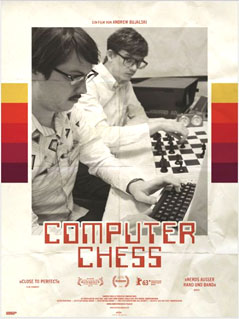 ½
½
USA 2013
Starts November 7, 2013
Directed by: Andrew Bujalski
Writing credits: Andrew Bujalski
Cast: Gerald Peary, Jim Lewis, Freddy Martinez, Myles Paige, Kevin Bewersdorf, Bob Sabiston, Robin Schwartz, Gordon Kindlmann, Patrick Riester, Tishuan Scott, Chris Doubek, Cyndi Williams, Annie LaGanga, Dustin Guy Defa
Length: 92 minutes
 Funky. Retro. Original. And not a documentary. Pat Henderson (Peary) opens the chess players’ annual weekend tournament in a competitively charged atmosphere. Software programmers, including teams from MIT (Massachusetts Institute of Technology) and Caltech (California Institute of Technology), are primed. The era: circa 1980. The prize: $7,500.00. The software winner: face-off with human chess wizard Henderson. MIT’s team, led by mastermind McVey (Sabiston) includes the “first-ever” girl (Schwartz). Tsar, the reigning computer, flummoxes geeky Peter (Riester); his mentor, and program genius Dr. Schoesser’s (Kindlmann) unconcern is disconcerting. Away from the tournament, the eccentric intellects hypothesize about future software, a third world war, and analog vs. artificial intelligence and automation.
Funky. Retro. Original. And not a documentary. Pat Henderson (Peary) opens the chess players’ annual weekend tournament in a competitively charged atmosphere. Software programmers, including teams from MIT (Massachusetts Institute of Technology) and Caltech (California Institute of Technology), are primed. The era: circa 1980. The prize: $7,500.00. The software winner: face-off with human chess wizard Henderson. MIT’s team, led by mastermind McVey (Sabiston) includes the “first-ever” girl (Schwartz). Tsar, the reigning computer, flummoxes geeky Peter (Riester); his mentor, and program genius Dr. Schoesser’s (Kindlmann) unconcern is disconcerting. Away from the tournament, the eccentric intellects hypothesize about future software, a third world war, and analog vs. artificial intelligence and automation.
Concurrently, a couples-therapy seminar begins. Led by an African guru (Scott), the reenactments and the jargon are new; the couples enthuse. One in particular: a teacher and secretary (Doubek, Williams) are drawn to the artificial intelligence progenitors. Their not-so-subtle seduction of Peter is akin to a face-off between logic and spirituality. Papageorge (Paige), a wily freelancer and freeloader extraordinaire, first notices the cat epidemic while wandering in search of a room at the overbooked hotel. And everyone wants the conference room.
This wryly humorous, idiosyncratic film gives us a peek at the then emerging technology geniuses, and their forecast for the future (ours). Audiences will chuckle hearing the cameraman’s (Guy Defa) prediction. Notice his vintage video tube-camera, which cinematographer Matthias Grunsky uses to mimic the monochromatic 1980s technology patina. Just as hairstyles, spandex, lingo, and especially the weighty computers evoke sentient nostalgia. A bevy of (Austin) Texans act in Bujalski’s carefully thought-through film; what appear to be technological errors are calculated choices. Thereby allowing us to decide the winner: analog, or automation. ()
